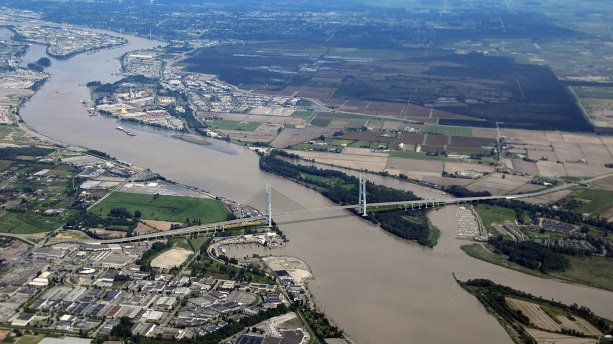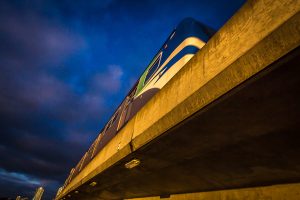The province of B.C. has announced it will cancel procurement on the George Massey Tunnel replacement bridge project to investigate other transportation options for the corridor.
The decision has prompted strong statements from both those in favour and against the project, which would span from Richmond to Delta.
Richmond Mayor Malcolm Brodie is ready to assist the reviewers in looking at other options.
"We are pleased that the province has decided to pause the project and take a very long look at it to see what is the best way to move forward, with the recognition that there is a serious congestion problem in the corridor," he said. "We need to solve that problem."
Richmond City Council has come up with two alternatives to building a bridge. The first would retain the existing Massey Tunnel and add a four-lane tunnel. The other would also retain the existing tunnel but add a two-lane bus-High Occupancy Vehicle only tunnel.
Brodie has criticized the bridge project for its impact on traffic, local roads and agriculture. He also doesn’t believe it is consistent with the Regional Growth Strategy or the Mayors’ Council Vision for Regional Transportation Investments.
"I have no doubt at least one of the major motivators was that the port wanted a high bridge and the tunnel out so they could get the biggest freighters up and down that river. I have no doubt of that at all," Brodie said. "I think that decision was made early and felt if the tunnel was left in place it would have been an impediment to shipping."
Delta South MLA Ian Paton disagreed, arguing the bridge project is an urgent, essential project for local drivers.
"This is an unacceptable delay for those who travel through the tunnel every day," said Paton. "This is a project that needs to be built in order to protect those who could be caught in the tunnel during an earthquake as well as relieve pressure on the worst bottleneck in the province. This will cost taxpayers millions right now and likely billions when the NDP realize a new crossing – a bridge – is needed."
He added the replacement bridge would save rush-hour commuters up to 30 minutes for the 80,000 people a day who use the tunnel. Benefits would also be felt across the province by improving movements of people and goods along a route that moves $25 billion worth of goods per year.
According to the province, current procurement activity is now on hold until the results of the review are released and the project will not be budgeted for in the government’s capital plan.
Officials said the terms of the request for proposals dictate that each of the two final bidding teams will be paid up to $2 million to help offset their expenses to date.
So far the province has spent approximately $66 million on the estimated $3.5-billion bridge project and BC Hydro has spent approximately $25 million on its transmission relocation project.
The province made it clear, however, that none of this has been in vain as the completed work will be utilized no matter what option is chosen.
The Independent Contractors and Businesses Association (ICBA) has expressed disappointment with the government’s decision.
"Governments at all levels too often put off the investment in key infrastructure projects that we need to move people and goods safely and effectively throughout our region," said ICBA president Chris Gardner. "The Pattullo Bridge is an example of this, a piece of infrastructure whose replacement is long overdue and it now stands as a significant risk to public safety. The Massey Tunnel is nearly 60 years old and we cannot continue to ignore replacing this important link on one of our major traffic corridors and be in a similar situation as we are with the Pattullo Bridge."
Gardner cited a report by the City of Delta which points to the bridge as the safest and most economical option.
"It is easy to find reasons to say no to building new projects," Gardner said. "The challenge our political leaders face is finding the courage to say yes and build new infrastructure."
The Progressive Contractors Association of Canada (PCA) was also unhappy with the delay.
"Our members have invested considerable time and effort in planning what we believe was the best solution to easing the worst traffic bottleneck in the province," said Rieghardt van Enter, B.C. regional director for PCA in a press release. "This crossing is just too important to commuters, communities and industry not to get going with a replacement project as soon as possible."
The PCA noted that over a three-year period, a great deal of work has been done. More than 3,000 participants have been involved in the public engagement process and dozens of meetings with Metro Vancouver, TransLink, Richmond and Delta have been held to discuss the project scope.
The NDP government has stated that the Ministry of Transportation and Infrastructure is proceeding with an independent technical review of the tunnel corridor to "find a solution that gets people and goods moving and makes sense for commuters across the region."
The ministry is still looking to recruit someone to lead the review who has expertise on highway infrastructure construction, transportation planning and traffic engineering.
The province explained the review will focus on what level of improvement is needed in the context of regional and provincial planning, growth and vision as well as which option would be best for the corridor, be it the proposed 10-lane bridge, a smaller bridge or a tunnel.
The review will also take stock of what work has already been completed.
B.C.’s work on the project, up to this point, will be looked at closely, including technical information developed by the project team and from Metro Vancouver municipalities as well as new analysis that includes looking at how the removal of tolls will affect the crossing.
Based on the recommendations received, the province will then determine next steps to address the congestion along the Highway 99 corridor.











Recent Comments
comments for this post are closed